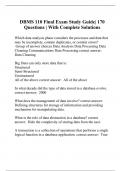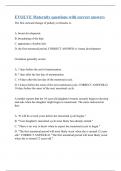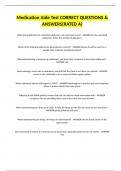Interdisciplinary Perspective on
Intergroup Relations
HC1 - Introduction 1
HC2a - Realistic Group Conflict Theory 3
HC2b 5
HC3a - Contact theory 6
HC3b 7
HC4a - RWA/SDO 8
HC4b 11
HC5a - ITT/Socialization 11
HC5b 13
HC6a - Voting for radical right-wing 13
HC6b 15
HC7a - Measuring prejudice 15
HC7b 19
HC8a - Bias on the left 19
HC8b 22
Overview of Concepts 23
Short Summaries of Articles 25
,HC1 - Introduction
Categorization process is a central component of Social Identity Theory. Two perspectives:
● Evolutionary perspective: necessary to distinguish friend and enemy.
● Cognitive perspective: necessary to process large amounts
of information.
People search actively for information and simplify processing it by;
● Ignoring certain differences.
● Emphasizing (or exaggerating) certain similarities of that information.
○ According to Taifel’s experiment: categorization of non-social
stimuli overemphasizes similarities within groups and
differences between groups.
There are different identifying strategies:
Group formation leads to discriminatory behavior, which is called ingroup favoritism.
● Even if groups are formed on the basis of a trivial category.
● Tajfel: ‘Social categorization per se is a sufficient condition for the development of
intergroup bias’ (discrimination in favor of one's own group).
The social identity theory has four central concepts:
1. Social categorization: process of bringing together social objects or events in groups
which are equivalent with regard to an individual's actions, intentions and system of
beliefs.
○ Similar to categorization of non-social stimuli:
■ Use of any characteristic available
■ Perceive more similarity within and more difference between
categories.
○ Not just the basis of how we perceive the world, but also who we perceive
ourselves.
2. Social identity: based on the realization that one belongs to a social category and the
positive or negative evaluation associated with this membership. Characteristics:
○ Are divisive and exclusive.
○ Are context dependent.
○ Have a cultural component: this turns a category into an identity.
○ Include a judgment of the nature of people in a certain category.
→ This is more than a minimal group. Social identities may thus have
even more powerful consequences in intergroup interaction.
1
, 3. Social comparison: Through comparison with other groups, people try to evaluate
their group’s relative status.
○ People strive for a positive social identity.
○ People are motivated to belong to a positively evaluated group.
○ They value their own group more than other groups (social identification
versus contra-identification).
■ Social identification: applied positive characteristics to the ingroup.
■ Contra-identification: applied negative characteristics to the outgroup.
4. Psychological group distinctiveness: Need for belonging to a positively evaluated
group but also need to be distinct from others.
○ People thus try to achieve a position of their group that is distinct and positive.
Strategies concerning social identity:
*Absorption: assimilation with the outgroup; blending in.
*Change meaning of group traits: e.g movements like feminists and black lives matter.
*Compare on other dimension: creativity; creating a different basis for group comparison and recognition.
*Compare to other groups: finding similarities/differences with a (higher/lower) group to justify themselves.
*Social competition: protesting for certain policies and rights.
Summary of the Social identity theory:
● Helps understand positive and negative social relationships.
● Explains behavior of dominant and subordinate groups.
● Allows clear hypotheses about group members’ behavior if they face negative social
identity.
● Is broadly applicable.
2










